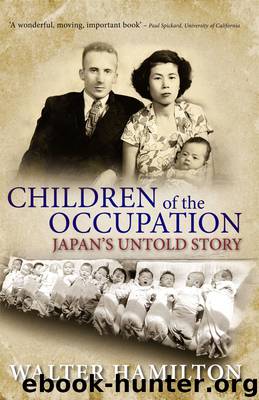Children of the Occupation by Walter Hamilton

Author:Walter Hamilton
Language: eng
Format: epub
Publisher: NewSouth
13
Kiyotaka’s story
Corporal Charles Nation, a gangly, fair-haired, 26-year-old Australian veteran of the Borneo campaign, joined BCOF in 1947 and was assigned as an orderly-room clerk. Yoshie Kawasaki, a former film actress, was a war widow with a young son, struggling on a housemaid’s wage. She jumped at the chance of earning three times more as a BCOF typist. And so they met. In March 1948, they exchanged marriage vows in a Shinto ceremony.
After the birth of their son, Kiyotaka, Charles supported his family by trading on the black market. Several times a week, dodging police surveillance, he bicycled between his camp and the house they kept in Yoshiura, a suburb of Kure. It was another four years before he and Yoshie could register their marriage.
Charles’s relations, back in the Victorian country town of Echuca, remained none the wiser. Interviewed late in life, he explained his reluctance to pass on the news:
Our young bloke came along in July 1950. It took a couple of hard years’ work to manufacture him. It wasn’t until he was nearly three years old that I wrote home and told the folks that I’m an old married man and a father.
Well, the poor old lady she just about went into hysterics. She couldn’t believe that her youngest boy had got himself married to a foreigner, least of all a Japanese.
I had a pretty general idea of the feeling of Australians at that time, and immediately after. And I thought, it would be no hardship for me to take her home and reside in Australia, but there’d be a hardship imposed on her. So that was the genesis of my thinking of remaining in Japan. The only reason I remained in Japan was because of my wife. Since I believe I married the most wonderful woman in the world, why need I embrace anything else?1
‘They loved each other and were very close’, says Kiyotaka, ‘but they fought all the time’. He mimics his father: ‘Australia, number one! Japan, number ten!’ Then he acts his mother, in high dudgeon: ‘My government surrendered to your government. But I never surrendered to you! Go home! Go back to Australia’. Charles would try to pacify her: ‘OK, Yoshie. OK’. He knew the storm had passed once she expelled a final ‘Humph!’
Charles never mastered Japanese and does not seem to have made close friends outside his family’s immediate circle. Kiyotaka reckons his father never got beyond his first impression of a broken, ugly country.
When he came to Japan in 1947, at that time everything was monochrome: black and white – no colour. Everything was dirty. The air was dirty. The water was dirty. The food was dirty. That’s why he always complained: ‘I hate Japanese’. Everything had to be perfect. He wanted perfection, but he was not a perfect man. I was scared of him. Just before he died, he told me: ‘I like today’s young Japanese, but I still hate the ones my own age’.
His behaviour was outrageous. Whenever we went
Download
This site does not store any files on its server. We only index and link to content provided by other sites. Please contact the content providers to delete copyright contents if any and email us, we'll remove relevant links or contents immediately.
| African-American Studies | Asian American Studies |
| Disabled | Ethnic Studies |
| Hispanic American Studies | LGBT |
| Minority Studies | Native American Studies |
Cecilia; Or, Memoirs of an Heiress — Volume 1 by Fanny Burney(32544)
Cecilia; Or, Memoirs of an Heiress — Volume 2 by Fanny Burney(31939)
Cecilia; Or, Memoirs of an Heiress — Volume 3 by Fanny Burney(31928)
The Great Music City by Andrea Baker(31915)
We're Going to Need More Wine by Gabrielle Union(19032)
All the Missing Girls by Megan Miranda(15937)
Pimp by Iceberg Slim(14481)
Bombshells: Glamour Girls of a Lifetime by Sullivan Steve(14047)
For the Love of Europe by Rick Steves(13890)
Talking to Strangers by Malcolm Gladwell(13344)
Norse Mythology by Gaiman Neil(13343)
Fifty Shades Freed by E L James(13231)
Mindhunter: Inside the FBI's Elite Serial Crime Unit by John E. Douglas & Mark Olshaker(9313)
Crazy Rich Asians by Kevin Kwan(9274)
The Lost Art of Listening by Michael P. Nichols(7487)
Enlightenment Now: The Case for Reason, Science, Humanism, and Progress by Steven Pinker(7305)
The Four Agreements by Don Miguel Ruiz(6744)
Bad Blood by John Carreyrou(6610)
Weapons of Math Destruction by Cathy O'Neil(6263)
